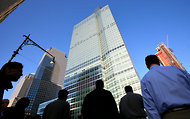Two weeks later, Lehman Brothers failed and a panic began. The crisis demonstrated how interconnected the world financial system had become and how vulnerable even apparently healthy banks were when their competitors began to crumble. In the weeks that followed, most large banks around the world had to be bailed out. Their share prices plummeted.
Since then, however, some big banks have performed much better than others — a difference based to a significant extent on just how well, or badly, each bank had been run in the months and years leading up to the crisis.
The accompanying charts show the performance of 25 large banks around the world. As the crisis began, each of them ranked in the top 20 in the world in at least one of three measurements — market capitalization, book value or total assets.
In the weeks and months that followed, all but one of them lost at least half of their market value, as measured in the local currency of the bank’s primary market. The exception was a Chinese bank, the Industrial and Commercial Bank of China, whose shares lost less than a third of their value.
The charts also show the performance of the Bloomberg World Bank Index, which comprises more than 140 banks and has done better than most of the large bank stocks. This was a crisis where bigger was not necessarily better, and where some of the largest banks proved to be far from adequately capitalized, notwithstanding what their books had indicated before Lehman collapsed.
This spring, the world bank index got back to within 3 percent of its level at the end of August 2008, although it has since slipped back and is now 11 percent lower. Few of the large banks shown have done as well.
But a handful of banks turned out to be profitable long-term investments that August. Shares of both JPMorgan Chase and Wells Fargo in the United States are now more than 40 percent higher than they were. Shares of two of the three Chinese banks shown — Bank of China and China Construction Bank — are higher now than they were five years ago, while the third is approximately unchanged. In Britain, HSBC is up about 13 percent, a much better performance than was shown by other large European banks. It did not hurt that HSBC had a significant presence in many developing countries, most of which rode out the recession reasonably well even though some have stumbled this year.

Floyd Norris comments on finance and the economy at nytimes.com/economix.
Article source: http://www.nytimes.com/2013/08/31/business/economy/some-big-banks-thrive-despite-chaos-of-2008.html?partner=rss&emc=rss

